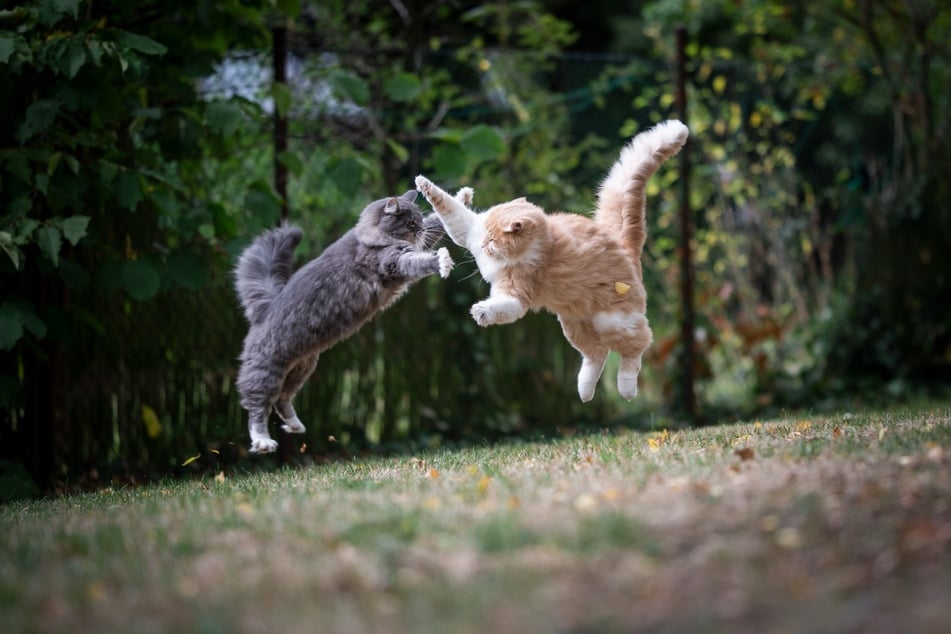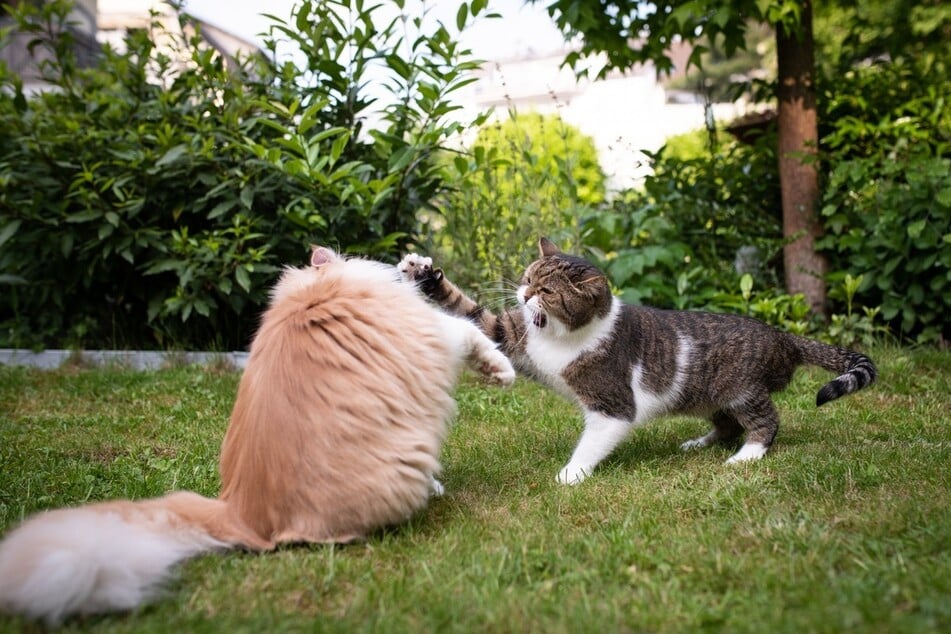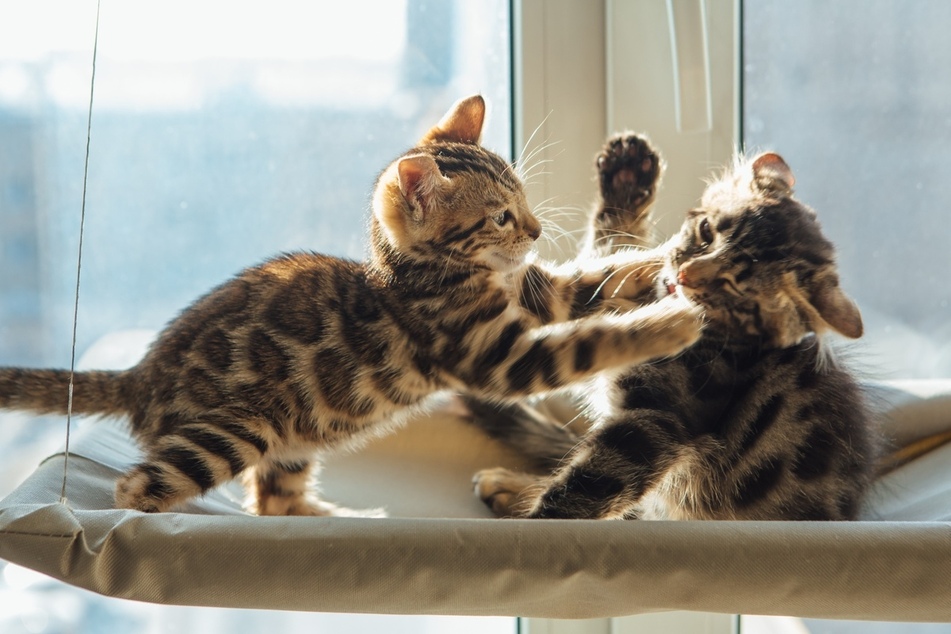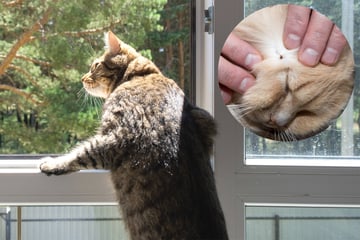Cat fights: How to recognize and stop cats fighting
Cats seem to be constantly at each other's throats, largely because of how stubbornly territorial they can get. How can you recognize a cat fight, how can you prevent them from happening, and how can you stop them?

Cats love to fight, baring their sharp and fearsome teeth and going in for fluffy brawls that leave both scraped parties and bruised. It's natural, but not the best behavior in the world. Try not to despair if your cat has been particularly rowdy as of late. These fluffy fellows are more manageable than you'd think.
In this cat guide, TAG24 will take a look at cat fights. How do you recognize a cat fight, how do you stop cats from fighting, and how do you reduce the risk of repeated kitty conflict?
How to recognize a cat fight
There's a big difference between playful romping and fighting. They are both equally normal behaviors, but one is far more destructive than the other. While cats can get hurt during play, this is an unintentional side effect and you shouldn't stop play altogether because of the risk. When it comes to fighting, though, it's a different story.
When a cat is romping around and playing with another kitty, it is doing so out of a happiness, trust, and a need to practice its various skills without fighting. When it starts attacking, though, there will be some kind of trigger. Anger exists in cats too, and there are noticeable difference between two cats that are playing and two cats that are fighting.
Here's how to tell if a cat is fighting or playing:
- Listen to how your cats sound: If they are howling and hissing then they are angry and fighting. If they are chirping and meowing, they are playing.
- Cats adopt different postures during a fight: If a cat is jumping around and using its agility, tail wagging, then it is likely playing. In the case that it is all stiff and displaying aggressive cat body language then it is possibly fighting.
- Look at their eyes: Dilated pupils are a sign that cats are fighting.
- Their fur changes: When cats fight, their fur bristles. This will likely not happen if they are playing.
- The bites are different: A playful nip here and there is normal, and will cause no serious harm. If it is getting genuinely aggressive and risking harm, it could be a fight.
- The way they chase each other: Playing cats will take turns chasing each other, but when they fight they will be trying to overwhelm their opponent and certainly won't be taking turns.
It's worth taking a look at how your cat is behaving. If it is playing then there's nothing you need to do, but if it is fighting then action may be needed.
Why won't my cats stop fighting?
Consistent aggression and bad behavior can be a sign of ill health or underlying medical conditions in your cat. It is a serious issue, and one that should be taken seriously. Sure, some cats are just grumpy grouches, but if your cat is usually happy, relaxed and friendly, but is fighting with other cats all-of-a-sudden, the veterinarian may need to be your next stop.
If your cats keep fighting then it could be a sign that something more is wrong than just a simple misunderstanding or territorial dispute between feline friends. Instead, your cat could be suffering from pain or discomfort that is causing it to act out and not be itself.
In any situation where your cat's behavior has radically changed in a short space of time, you should take it to the veterinarian as soon as possible. This is the same if your cat has started fighting.

How to stop cats fighting
If you have noticed that your cats are involved in a serious dispute, and they are fighting right in front of you, it can be risky to try and break them up. You could easily get slashed or bitten, or your cats could get hurt by the force you'd need to exert to get them away from each other.
That being said, it's not impossible. There's a non-physical way to get your two cats apart (or any two cats) and a physical way to do the same. While the latter is, of course, riskier, it's also the more likely to be successful. Once you have stopped the fight, you can start working on ways to prevent future conflict.
Let's take a look at our two favorite ways to stop fighting cats:
- Make loud noises: A great way to separate two cats that are at each other's throats is to simply make as much noise as possible. You want to walk towards them, yelling and clapping your hands, until they run away from each other. You are scaring them and creating the perception of a bigger threat, which they will individually run away from, ending the fight.
- Create spatial separation: Alternatively, it's time to call your friend, partner, wife, sibling, or neighbor. While wearing oven mittens (or something similarly protective), attempt to pick up one cat each, physically separating them by moving them away from each other. Be aware, though, they then need to be properly separated so that they don't just run back and fight again. On top of that, be extra careful - you're dealing with angry cats, they'll happily hurt you.
Important: If it's a minor scuffle, or your cats are just playing, then it's best not to intervene. Small feline disagreements and minor kitty conflicts are completely normal and you should try not to overreact. Hierarchies are important to cats, you should allow them to work it out naturally.
How to prevent cats from fighting

The best way to treat a problem is to try and prevent the problem from occurring in the first place. If you have noticed that your cats are fighting, or are perhaps having yard or territory battles outside, there are various things that you can do to stop this from happening.
With a few simple changes here and there, you can get your indoor and outdoor kitties getting along peacefully, like a slightly-less-violent house on fire. Remember that you are their kitty mum or dad, you have the authority here, they need to do what you tell them to do.
Here's how best to prevent your cats from fighting:
- Make sure you adopt like-minded cats, as they get along better
- Get your cats neutered as this reduces aggression and improves behavior
- Separate each cat's litter boxes, so there is less competition and they feel safer when relieving themselves
- Make sure that food bowls are kept separate, in different feeding areas
- Create retreats for each cat, so it has its own spot that cannot be inhabited by another kitty
- Provide a peaceful and calming atmosphere at home
- Don't let your cats go outside at nighttime
It's impossible to entirely prevent cat fighting, but by taking these few simple steps, you'll quickly and easily reduce the frequency and intensity of their fights, and will keep your feline friendly home as relaxed as possible.
It can be hard to stop cats fighting at night or outside
It is always best to keep tight control of your cat where and when you can. That doesn't mean that it should never be let outside or should be supervised 24/7, but it does mean that you should avoid letting them out at night. This is when the majority of cats will fight, as it is when they are the most active, and therefore has the highest level of risk.
Instead, try to only let your cat outside during daytime hours. During the day they are more likely to sleep under a tree than brawl with another kitty. They might still fight from time-to-time, but it'll certainly be less common!
Cover photo: 123RF/nilsjacobi



